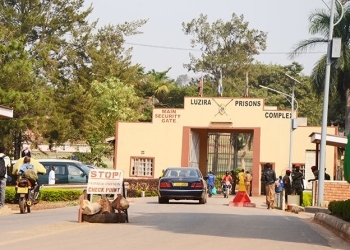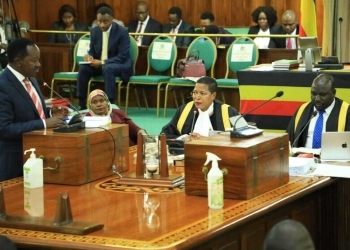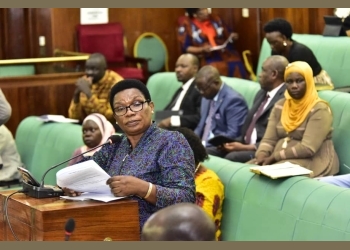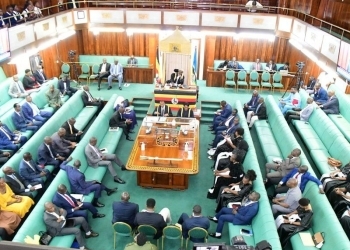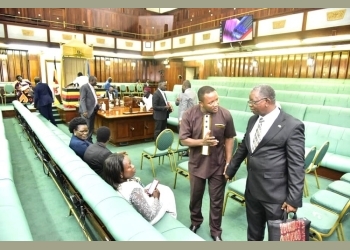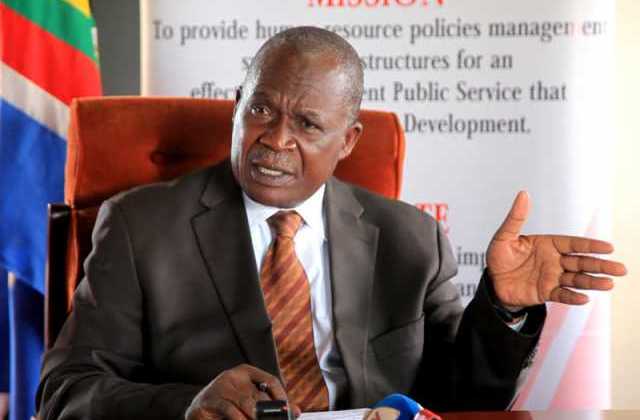
Stopping a Member of Parliament or Councilor from increasing their pay as priority over all expenses. This will be resolved by establishing the Salaries and Remuneration Board.
- The 2016-2021 National Resistance Movement (NRM) Manifesto which is also the 5th Manifesto since 1996, has 23 development priorities code-named – Kisanja Hakuna Mchezo and was developed under the theme “Taking Uganda to Modernity through Job-creation and Inclusive Development”. The Manifesto is premised on the idea of a country governed on the principles of equal opportunity and shared prosperity. It lays out the citizens’ commitment to building a better future by establishing a socio-economic and political order through a popular and durable National Constitution based on the principles of unity, peace, equality, democracy, freedom, social justice and progress.
- MANIFESTO COMMITMENTS RELATED TO THE PUBLIC SERVICE
- The Manifesto commitments (2016-2021) that fall under the mandates of the Ministry of Public Service include:
- The Commitment under Good Governance (paragraph 2.2) :
- Carrying out reforms aimed at improving public service efficiency and reducing the cost of doing business. The Manifesto undertook to restructure Public service institutions as part of the reforms to improve efficiency and effectiveness. Particular focus was to be placed on strengthening public sector management systems support to private sector growth.
- The One-stop business centre concept being piloted at the Uganda Registration Services Bureau (URSB) is to be introduced in other key towns to reduce bureaucracy and the cost of doing business in the country.
- Introduction of the National Identity Card to help in the fight against crime, tax evasion and corruption by eliminating ghosts on the pay roll.
- Issuing performance-based contracts for senior public servants and pegging performance of sectors and ministries to agreed priorities and positions.
- Easing the requirements for jobs in districts (and also in the public service) to enable young people who qualify to successfully apply for them.
- The commitment under Public Sector Management (Paragraph 4) committed to:
- Fill staffing and other professional capacity gaps, avoiding duplication of roles and ensuring timely execution of projects and programmes.
- Establishing One-stop business centres in Kampala and other regional towns (Jinja, Gulu, Mbarara, Kabale, Hoima and Arua) to reduce the cost of doing business across the country. Specially trained Uganda Registration Services Bureau staff are to be deployed in the Centres and facilitated through hotlines and broad band IT services to process business registrations and clearances.
- The Commitment under Human Capital Development (Paragraph 11) states as follows:
- Gradual increase of the teachers’ pay to competitive levels to enhance professional commitment and morale. These will increase progressively over the years until accumulative attainment of 50% of the current (2015) pay.
- This salary should be comparative to that offered by most private schools.
- Teachers in hard to reach and hard to stay districts are to be paid additional allowances of 30% of basic salary.
- Recruitment of additional Secondary School teachers to meet the increasing demands.
- Health workers were recruited to 100% staffing level by 2018.
- Continuous improvement of the remuneration of health workers, especially those in hard-to-reach areas of the country.
- The Citizens’ have similarly expressed their aspirations under the NRM Manifesto 2016- 2021 relating to the Public Service. This includes:-
- Establishment of a national health services delivery system and a national health insurance scheme;
- Dignified working conditions and rewarding remuneration for teachers, health workers, men and women in the security forces;
- Operationalization of an Independent Salaries and Remuneration Commission;
- Stopping a Member of Parliament or Councilor from increasing their pay as priority over all expenses.
- STATUS OF IMPLEMENTATION OF THE NRM MANIFESTO COMMITMENTS RELATED TO THE PUBLIC SERVICE BY 2020
- In fulfillment of the mandate of the Ministry of Public Service of “developing, managing and supervising the implementation of Human Resource Policies, Management Systems, Procedures and Structures for the Public Service as well as Overseeing the implementation of the Constitutional provisions and the Public Service Act 2008 and other laws and policies relating to the proper functioning and the efficient operations of the Public Service, the Ministry achieved the following in relation to the NRM Manifesto 2016-2021:-
- Pay enhancement for Scientists, Public Universities, Teachers, Health Workers and other Public Sectors
Government committed to pay salaries of teachers at competitive levels. Pay of health workers, Scientists, University Professors, Researchers and the Public Service generally were scheduled enhancement taking into account benchmark jobs in the Country and the region in a phases.
- In fulfillment of the above commitment, Government has since the approval of the pay policy principles and long term pay targets for all public servants under Cabinet Minute Nos. 502 (CT 2017) and 509 (CT 2018) enhanced pay for a number of civil servant categories under phases 1, 2&3. Pay enhancement in the Public Service since FY 2015/2016 has been achieved as below: The overall wage bill of Government has over the years increased from UGX. 4.244Trillion in FY 2018/19 to in FY 2019/2020. This has further increased to UGX. 5.095 trillion in FY 2020/2021.
| Category | Salary (pm) FY 2015/ 2016 | Salary (pm) FY 2020/2021 | Approve Pay Target (FY 2022/2023) | Percentage of Approved pay target achieved |
| Permanent Secretary (U1S) | 3,768,835 | 15,400,000 | 20,000,000 | 77 |
| Director (Non Scientist) (U1SE) | 2,369,300 | 2,369,300 | 17,400,000 | 14 |
| Director (Scientist) (U1SE) | 2,893,252 | 3,600,000 | 17,400,000 | 21 |
| Chief Administrative Officer (U1SE) | 2,369,300 | 2,369,300 | 17,400,000 | 14 |
| Senior Consultant- Medical (U1SE) | 3,447,065 | 7,307,602 | 17,400,000 | 42 |
| Commissioner (Non Scientist) (U1SE) | 1,859,451 | 1,859,451 | 14,000,000 | 13 |
| Commissioner (Scientist) (U1SE) | 2,370,401 | 3,050,000 | 14,000,000 | 22 |
| Consultant- Medical (U1SE) | 2,628,075 | 6,035,667 | 12,750,000 | 47 |
| Pilot (U1SE) | 2,543,627 | 20,000,000 | 29,000,000 | 69 |
| Captain (Helicopter) (U1SE) | 2,509,705 | 20,250,000 | 30,500,000 | 66 |
| Principle Medical Officer (Medical Officer Special Grade)- (U2) | 2,058,276 | 4,500,962 | 8,000,000 | 56 |
| Medical Officer (U4) | 1,117,688 | 3,000,000 | 5,000,000 | 60 |
| Graduate (Scientist) (U4) | 1,117,688 | 2,200,000 | 4,800,000 | 46 |
| Graduate (Professional) (U4) | 940,366 | 940,366 | 4,800,000 | 20 |
| Graduate (Administrative) (U4) | 798,535 | 798,535 | 4,800,000 | 17 |
| Nursing Officer (U5) | 792,885 | 1,200,000 | 3,000,000 | 40 |
| Warder/Warden/Police Constable (U7) | 397,748 | 497,748 | 1,350,000 | 37 |
| Enrolled Nurse/ Midwife (U7) | 432,782 | 613,832 | 1,350,000 | 45 |
| Driver (U8) | 237,069 | 237,069 | 1,100,000 | 22 |
| Category | Salary (pm) FY 2015/ 2016 | Salary (pm) FY 2020/2021 | Approve Pay Target (FY 2022/2023) | Percentage of Approved pay target achieved |
| Head Teacher- Secondary School (U1E) | 1,728,007 | 2,380,000 | 10,000,000 | 24 |
| Deputy Head Teacher-Secondary School (U2) | 1,291,880 | 1,740,001 | 7,400,000 | 24 |
| Graduate Secondary School Teacher (U4) | 961,199 | 1,210,213 | 4,800,000 | 25 |
| Diploma Secondary School Teacher (U5) | 720,805 | 933,966 | 3,500,000 | 27 |
| Head Teacher of a Primary School (U4) | 799,323 | 980,211 | 4,800,000 | 20 |
| Grade III Teacher (U7) | 467,685 | 568,166 | 1,350,000 | 42 |
| Category | Salary (pm) FY 2015/ 2016 | Salary (pm) FY 2020/2021 | Approve Pay Target (FY 2022/2023) | Percentage of Approved pay target achieved |
| Vice Chancellor of a Public University (M1) | 9,626,364 | 20,000,000 | 20,000,000 | 100 |
| Deputy Vice Chancellor of a Public University (M2) | 8,377,961 | 17,400,000 | 17,400,000 | 100 |
| Professor of a Public University (M3) | 8,031,761 | 15,600,000 | 15,600,000 | 100 |
| Associate Professor of a Public University (M4) | 7,537,144 | 14,800,000 | 14,800,000 | 100 |
| Lecturer of a Public University (M5) | 6,156,020 | 8,174,143 | 13,500,000 | 61 |
| Teaching Assistant of a Public University (M6-2) | 4,043,083 | 5,718,179 | 9,600,000 | 60 |
| Category | Salary (pm) FY 2015/ 2016 | Salary (pm) FY 2020/2021 | Approve Pay Target (FY 2022/2023) | Percentage of Approved pay target achieved |
| Chief Justice (U1S) | 11,560,150 | 26,500,000 | 26,500,000 | 100 |
| Principal Judge (U1S) | 10,018,796 | 24,000,000 | 24,000,000 | 100 |
| Justice of Supreme Court (U1S) | 9,688,216 | 23,500,000 | 23,500,000 | 100 |
| Judge of a High Court (U1S) | 9,026,743 | 22,500,000 | 22,500,000 | 100 |
| Registrar (Courts of Judicature) (U1SE) | 4,804,800 | 10,500,000 | 18,500,000 | 57 |
| Chief Magistrate (U1SE) | 3,146,000 | 7,500,000 | 14,000,000 | 54 |
| Magistrate Grade I (U4) | 1,258,400 | 3,200,000 | 5,000,000 | 64 |
| Solicitor General (U1S) | 4,804,800 | 15,400,000 | 20,000,000 | 77 |
| Director of Public Prosecution (U1S) | 4,064,736 | 22,500,000 | 22,500,000 | 100 |
| Deputy Director of Public Prosecution (U1SE) | 4,064,736 | 13,600,000 | 17,500,000 | 78 |
| Commission Legal (U1SE) | 3,146,000 | 7,500,000 | 14,000,000 | 54 |
| State Attorney (U4) | 1,258,400 | 2,730,240 | 5,000,000 | 55 |
| State Prosecutor (U6) | 737,837 | 1,006,400 | 3,500,000 | 29 |
| Category | Salary (pm) FY 2015/ 2016 | Salary (pm) FY 2020/2021 | Approve Pay Target (FY 2022/2023) | Percentage of Approved pay target achieved |
| Chairperson of Appointing Commission (U1S) | 8,457,300 | 21,200,000 | 21,200,000 | 100 |
| Member of Appointing Commission (U1S) | 8,007,300 | 19,200,000 | 19,200,000 | 100 |
- By FY 2020/2021; Public Universities will be enhanced on average by 75% of the long term pay targets. Justices and Judges as well as central appointing commissions have been enhanced at 100% of the long term pay targets. Directorate of Public Prosecution staff, Ministry of Justice and Constitutional Affairs and Health Specialists have been enhanced at over 70% of the long term pay targets. Scientists and Pilots have as well been enhanced above 60% of the long term pay targets.
- Under the budget for FY 2020/2021, more funds have been provided to enhance Associate Professors, Professors, the Vice Chancellors and Deputy Vice Chancellor as well as researchers under NARO to 100% of the long term pay targets. Other Teaching staff and Scientists in Public Universities have as well been enhanced.
- Government will continue to provide resources to implement the approved long term pay targets for all Public Servants in a phased manner.
- Maintaining a lean Public Service and a manageable wage to Local Revenue ratio
The Public sector wage has grown from Uganda Shillings two point eight hundred eighty three trillion (2.883trn) in 2015/2016 to Uganda Shillings Five point zero thirteen trillion (UGX. 5.013trn) in 2019/2020. This means that Government has increased the wage bill by UGX. 2.13 trillion in four years representing a 42.49% growth of the wage bill.
The current (FY 2019/2020) wage bill accounts for twenty seven point eight five percent (27.85%) of the local revenue of FY 2019/2020 compared to Kenya’s wage to local revenue of fifty four percent (54%).
- The Ministry implemented the Hard to Reach (HtR) policy which was approved by Cabinet and introduced 30% hardship allowance for health, education and agriculture extension services in designated 16 Local Governments. This has significantly increased the staffing levels in those districts to over 85% by 2021 in addition to addressing issues of retention, absenteeism and staff motivation. The Ministry has undertaken a review and recommended enrolment of 22 new districts and 89 Sub-Counties as hard to reach spots. This is expected to be implemented under the 3rd National Development Plan (NDP III).
- Operationalization of One-stop Centre (Service Uganda Centres). Government has set up service Uganda Centres in Kampala, Jinja, Kasese, Entebbe and Mbale. Cabinet has directed setting up of Service Uganda Centres eighteen Regional Zonal Centres. Service Uganda Centres will allow the Public access real time services without having to spend money in travels but also address the current problem of red tape bureaucracies and the cost of doing business as well as promote the concept of one Government. All services of Government such as revenue, tax application, business registration, admission to schools, land registration and others shall be undertaken at these centres.
- Under restructuring of Public Service Institutions to improve efficiency, effectiveness and eliminate duplication. Government approved the policy on Rationalization of Government Departments, Agencies and Boards. An implementation modality has been developed and under the third National Development Plan (NDP III), Government will implement the policy directives. This is expected to result in operational efficiency, cost reduction, elimination of duplication and wastage of resources as well as removal of mandate overlaps.
- Staffing levels of Government Institutions
Government continues to strengthen its Human Resources through the provision of budgets for recruitment. The staffing levels in Government as at March 2020 stood at 319,396 out of an establishment of 527,003 thus representing a 65% staffing levels within the recommended minimum staffing levels in accordance with manifesto period. The staffing levels are expected to rise 68% in FY 2020/2021 with additional funding. Provision for recruitment of teaching staff in Public Universities, Primary and Post Primary Teachers as well as Health Workers under the UfIFT programme. Staffing levels under the third National Development Plan (NDP III) shall be further increased to an average of 80% with prioritization to the Health, Education and Production sector in addition to Scientist positions being filled to 100%.
- Introduction of the National Identity Card to help in the fight against crime, tax evasion and corruption by eliminating ghosts on the pay roll. Under this commitment, biometric validation and census of all public Servants and pensioners has been undertaken, an interface between NIRA and the payroll system was established. Ghost records have been deleted from the payroll and forwarded to the Inspectorate of Government. Seven Thousand, eight hundred seventy four (7,874) pensioners worth UGX. 2.652Bn per month were for example deleted from September, 2019 payroll Achieving efficiency in managing the Public Service through automation and integration of systems
In order to achieve operational efficiency, reduce cost of doing Government business, strengthen controls, manage performance of all public officers and Government Institutions, Government is in the processing of implementation introducing Human Capital Management System (HCM) which will seamlessly integrate with all Government systems such as the Budgeting system (Programme Budgeting System/PBS) and the Payment system (Integrated Financial Management System/IFMS) under Ministry of Finance, Planning and Economic Development, NIRA inclusive of the recruitment systems.
The HCM will facilitate full reconciliation and accountability; effective management of employee performance, discipline and grievance handling, increase employee competency through training and development, Talent and succession management for business continuity in addition to several other functions.
This will promote the concept of one Government and will leverage on existing Government infrastructure as application will be across all Government Ministries, Departments, Agencies and Local Governments. It will be hosted in the National Data Centre as part of the Government strategy of rationalising ICT infrastructure and applications as approved by Cabinet under Minute No. 261 (CT 2012).
- Status of implementing other commitments
- On Government’s resolve to issue performance-based contracts for senior public servants and pegging performance of sectors and ministries to agreed priorities and positions. The Ministry is implementing performance agreements for all heads of department, Heads of Schools and Government Departments. It has piloted Balanced Score Card in a number of Ministries which will eventually be rolled out to all Ministries, Departments and Local Governments under NDP III. Performance Management has also been strengthened by initiating a request to institute annual auditing of compliance to Performance appraisal by Office of the Auditor General
- Easing the requirements for jobs in districts (and also in the public service) to enable young people who qualify to successfully apply for them: Government approved establishment structures of Ministries, Departments and Local Governments and revised Job Descriptions and Persons Specifications for jobs in the Public Service.
The Job Descriptions and Persons Specifications provides for entry into the Public service without need for experience for the following categories:-
- Holders of Ordinary Level and Advanced level Certificates;
- Ordinary Diploma;
- Higher Diploma; and
- Bachelors’ Degree.
- Operationalization of an Independent Salaries and Remuneration Commission. Government approved the establishment of a Salaries and Remuneration Board. This is in line with the policy on rationalization of Agencies, Commissions and Authorities. Implementation has commenced with amendment of existing laws to give effect to the policy directives.
- Stopping a Member of Parliament or Councilor from increasing their pay as priority over all expenses. This will to be resolved by establishing the Salaries and Remuneration Board.
- Reforming the Public Service Pension Scheme (PSPS) to introduce efficiency and growth the retirement benefits sector
Government is in the process of introducing a Contributory Public Service Pension Scheme to replace the current unfunded and noncontributory Scheme. This reform will address Governance, accountability, sustainability and equity problems associated with the current unfunded PSPS. This will also increase the saving to GDP ratio, reduce the cost of borrowing and deepen the financial sector and create a vibrant social security sector.
The Fund is further expected to grow the financial sector and inject over two (2) trillion into the economy within 5 years through Civil Servants contributions alone.
The Bill is currently under considered by Cabinet and shall be enacted into law before FY 2021/2022 when the fund is expected to be established.
CONCLUSION
Government through the Ministry of Public Service remains committed to ensuring that the Public Service of Uganda is affordable, efficient and accountable in steering rapid Economic growth and social transformation.
Hon. Wilson Muruli Mukasa (MP)


